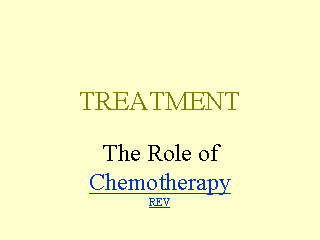Search inside of Supercourse and lectures in HTML and PPT format
 |
|

|
front |1 |2 |3 |4 |5 |6 |7 |8 |9 |10 |11 |12 |13 |14 |15 |16 |17 |18 |19 |20 |21 |22 |23 |24 |25 |26 |27 |28 |29 |30 |31 |review |
 Chemotherapy is a systemic treatment, and the main one used for disseminated cancer. It can be given with curative intent with success in a few of the less common tumors, but mostly its role is palliative, sometimes with improved survival. Unfortunately it has only minor activity with several of the common solid tumors. Its role in the adjuvant setting is still evolving. WHO has established an essential drug list of 14 drugs for treating the 10 most common cancers of adults. Another 6 drugs are used for pediatric tumors, and two more for adult leukemia and lymphoma. It is recommended that this essential drug list form the basis of national policies on the use of chemotherapy. Most of them are available in generic form, but their quality and biological activity must be routinely monitored. There are many considerations in the use of chemotherapy such as:
|